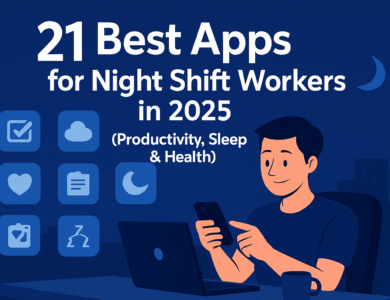
Many students have to juggle school with non-traditional work schedules. Night shift students find it hard to keep up with others because of tiredness and less access to help.
Can AI help night shift students get better grades?. Schools can use artificial intelligence to make learning more personal. This can make students more interested and help them do better in school.
As more students work at night, it’s key to look at how AI can aid them. This article will talk about the problems night shift students face. It will also show how AI-powered solutions can lead to better grades.
The Unique Challenges of Night Shift Students
Night shift students face many obstacles in their studies. They often study or work at night, which can affect their grades. These challenges are different from those faced by day students.
Two main challenges are sleep deprivation and managing time. It’s important to know these to help night shift students succeed.
Sleep Deprivation and Cognitive Function
Sleep is hard to get for night shift students. Working or studying at night messes with their body’s natural rhythm. This can hurt their brain’s ability to focus, remember, and make decisions.
Sleep Deprivation Effects:
- Impaired cognitive function
- Mood disturbances
- Reduced reaction time
- Increased risk of accidents or errors
A study shows how bad sleep deprivation is for night shift workers:
| Effects | Percentage of Participants Affected |
|---|---|
| Impaired cognitive function | 75% |
| Mood disturbances | 60% |
| Reduced reaction time | 55% |
Time Management Constraints
Night shift students struggle with time management. It’s hard to balance work, study, and personal life when the day is different.
Effective time management strategies are key. They need to set priorities, use calendars, and avoid distractions while studying.
Understanding night shift students’ challenges helps educators and support services. They can offer help with sleep and time management. This way, night shift students can do well in their studies.
Understanding How AI Can Support Academic Success
AI technology is changing how we learn, especially for non-traditional students. It’s making education better by helping students learn more and stay engaged.
The Evolution of Educational AI Tools
Educational AI tools have grown a lot. They started as simple grading systems and now offer personalized learning. These tools use machine learning algorithms to help students learn better.
AI tools are made to meet different learning needs. For example, they adjust the difficulty of course materials based on how well a student is doing. This makes sure students are challenged but not too hard.

Benefits of AI for Non-Traditional Students
Non-traditional students, like those working at night, face special challenges. AI tools help them succeed by offering:
- Personalized Learning Experiences: AI-driven platforms tailor learning to each student’s needs and pace.
- Flexible Access to Resources: AI tools are often online, so students can study whenever they want.
- Enhanced Support: AI chatbots and virtual assistants are always there to help with questions and tough topics.
| AI Tool | Benefit | Impact on Non-Traditional Students |
|---|---|---|
| Adaptive Learning Systems | Personalized learning experiences | Improves understanding and retention of complex concepts |
| AI-Powered Tutoring | 24/7 Learning assistance | Provides support outside traditional classroom hours |
| Automated Transcription Tools | Easy access to lecture materials | Saves time and enhances study efficiency |
By using these AI tools, non-traditional students can handle their school work better. This leads to better grades and more success.
Can AI Help Night Shift Students Get Better Grades?
Is AI helpful for night shift students aiming for better grades? This question is more important than ever. Schools are now focusing on students with non-traditional schedules.
Night shift students have unique challenges that can affect their grades. AI technology could help by offering personalized learning and support.
Research and Evidence
Research on AI in education is promising. It shows AI tools can greatly enhance learning by tailoring support to students.
A study in the Journal of Educational Computing Research found a big improvement in grades. Students using AI-based learning platforms did better than those without.

AI can offer flexible learning options and real-time feedback to night shift students. These are key for their success.
Success Stories and Case Studies
Many success stories and case studies show AI’s impact on night shift students’ grades. For example, a university used an AI tutoring system available 24/7.
| University | AI Tool Implemented | Outcome |
|---|---|---|
| University A | AI-powered tutoring system | 25% increase in average grades |
| University B | AI-based study guide | 30% improvement in student retention |
These stories show AI’s potential to improve night shift students’ grades.
AI-Powered Note-Taking and Study Materials
AI tools are changing education, especially for night shift students. They make note-taking and study materials better. This helps students manage their time and do better in school.
Automated Transcription Tools
One big problem for night shift students is taking notes during lectures. Automated transcription tools solve this by turning spoken words into text accurately.
Using Speech-to-Text for Lecture Recordings
Speech-to-text tech lets students record lectures and get transcripts automatically. It saves time and gives them a written copy of what was said in class.
Organizing Digital Notes with AI
AI helps organize digital notes by sorting them, marking important parts, and suggesting tags. This is super helpful for night shift students who need to study efficiently.

AI-Enhanced Study Guides
AI also makes AI-enhanced study guides that fit each student’s needs. These guides offer many study tools.
Customized Flashcards and Quizzes
AI creates customized flashcards and quizzes from a student’s notes. This makes studying more effective and helps remember important points better.
Concept Mapping with AI
AI also helps make concept maps that show how ideas are connected. This visual tool is great for grasping complex subjects.
| Feature | Description | Benefit |
|---|---|---|
| Automated Transcription | Converts lecture recordings into text | Saves time, provides written records |
| AI Organized Notes | Categorizes and highlights important information | Enhances review efficiency |
| Customized Flashcards | Generates study aids based on individual notes | Improves retention, personalized learning |
| Concept Mapping | Visually organizes information | Aids in understanding complex topics |
Virtual AI Tutors and Personalized Learning
Night shift students now get help from virtual AI tutors. These systems offer learning support any time, day or night. They are made to meet the needs of students with non-traditional schedules.
24/7 Learning Assistance
Virtual AI tutors provide 24/7 learning assistance. This means night shift students can get help anytime. It’s perfect for those studying late or early.
AI Chatbots for Immediate Help
AI chatbots are key in virtual AI tutors. They offer immediate help to students. These chatbots answer questions, explain concepts, and guide on various subjects.
Subject-Specific AI Tutoring Platforms
There are also subject-specific AI tutoring platforms. They focus on specific areas. These platforms give deep knowledge and tailored support, helping students excel.
Adaptive Learning Platforms

Adaptive learning platforms are vital in virtual AI tutors. They use smart algorithms to create personalized learning paths. These paths adjust to each student’s needs and abilities.
Personalized Learning Paths
These platforms analyze student performance and learning habits. They adjust the learning material’s difficulty and content. This ensures students are challenged but can progress at their own pace.
Progress Tracking and Analysis
These platforms also track and analyze student progress. Students can see how they’re improving over time. This helps identify where they need more help, allowing for targeted support.
In conclusion, virtual AI tutors are changing education for night shift students. They offer personalized learning, 24/7 support, and adaptive learning paths. As these technologies improve, they will play a bigger role in helping non-traditional students succeed.
AI Tools for Time Management and Productivity
Effective time management is key for night shift students. AI tools are making it easier. Night shift students have to handle work, study, and personal life. AI tools offer smart solutions for scheduling, organization, and focus.
Smart Scheduling Applications
AI-powered scheduling apps help night shift students manage their time better. These apps analyze schedules and suggest the best study times.
AI-Powered Calendar Optimization
AI optimizes calendars by integrating with schedules, setting reminders, and adjusting for changes. For example, Google Calendar can be linked with AI apps to schedule study sessions around work.
“AI-powered calendar optimization can help night shift students make the most of their limited time, ensuring they stay on top of their academic commitments.”
Study Session Planning for Night Shift Workers
AI tools plan study sessions based on a night shift worker’s schedule. For instance, AI-driven study planners allocate times for studying, breaks, and relaxation. This helps maintain a healthy balance between work and life.
Focus and Productivity Enhancers
Maintaining focus is hard for night shift students. AI tools offer focus techniques and productivity analytics to help them stay on track.
AI-Driven Focus Techniques
AI tools use the Pomodoro Technique for focused study sessions with breaks. AI-enhanced focus apps adjust these sessions based on the student’s productivity patterns. This helps them stay focused.
Productivity Analytics and Improvement
AI analyzes productivity patterns to find areas for improvement. It provides insights into time-wasting habits and suggests ways to improve. This empowers night shift students to boost their productivity.
By using AI tools for time management and productivity, night shift students can overcome challenges. They can achieve better grades and a more balanced lifestyle.
Leveraging AI for Research and Writing Assistance
AI has changed how night shift students do research and write. It helps them do research faster, write better, and manage their time well.
Research Automation Tools
Research automation tools are a big help for night shift students. They let students do deep research without spending hours. These tools use AI to make research easier.
AI-Powered Literature Reviews
AI can quickly go through lots of research papers. It finds important studies and summarizes them. This saves time and keeps students current with new research.
Data Analysis and Visualization Assistance
AI helps with data analysis and making it easy to understand. Tools like Tableau and Power BI use AI to make data clearer.
AI Writing Assistants and Editors
AI writing tools are changing how students write. They help with grammar, style, and making writing better.
Grammar and Style Enhancement
Tools like Grammarly and Ginger improve grammar and style. They make sure students’ writing is top-notch.
Citation and Reference Management
AI helps with citing sources and organizing references. It makes sure students follow the right citation styles.
Using these AI tools, night shift students can do better research and writing. This leads to better grades and success.
Implementing AI in Your Study Routine
AI can change how night shift students study. It helps make studying more efficient, tailored, and effective.
Creating an AI-Enhanced Study Plan
To make a study plan with AI, start by picking the right tools. These tools should match your learning style.
Step-by-Step Integration Guide
Here’s how to add AI to your study routine:
- Look at your current study habits and see what needs work.
- Find AI tools that fit your needs.
- Begin with one tool and add more as you get used to it.
- Keep track of how you’re doing and tweak your plan as needed.
Sample AI Study Schedules for Night Shift Students
Here’s an example study schedule:
| Time | Activity | AI Tool |
|---|---|---|
| 8:00 PM | Review notes | AI-powered note-taking app |
| 9:00 PM | Study session | Virtual AI tutor |
| 11:00 PM | Research assistance | AI research automation tool |
Balancing AI Assistance with Independent Learning
AI can really help your studies, but don’t rely too much on it. Too much AI can make you lose critical thinking skills.
To keep a good balance, do this:
- Use AI to help, not do all the work.
- Practice thinking and solving problems on your own.
- Check how you’re learning and find areas to get better.
By using AI wisely, you can get the most out of it while keeping your independence.
Overcoming Potential Drawbacks of AI Study Tools
As night shift students use AI study tools more, we must talk about their downsides. AI has many benefits, but we need to fix some issues for a good learning experience.
Addressing Privacy Concerns
One big worry with AI study tools is privacy. They need access to personal info, so keeping data safe is key.
Data Security Best Practices
To keep your data safe, follow these steps:
- Use strong, unique passwords for all accounts
- Turn on two-factor authentication when you can
- Keep software and apps up to date
- Be careful with links and attachments from unknown sources
These tips can help a lot in avoiding data breaches.
Choosing Privacy-Conscious AI Tools
When picking AI study tools, choose ones that care about privacy. Look for tools that:
| Feature | Description | Importance Level |
|---|---|---|
| Data Encryption | Protects your data when it’s moving or stored | High |
| User Anonymity | Let you use the tool without sharing your identity | Medium |
| Transparent Data Use | Tells you how your data will be used and shared | High |
A recent study said, “AI in education raises big questions about privacy and security”
“As AI gets more common in schools, we need strong ways to keep student data safe.”
Avoiding Over-Reliance on AI
AI study tools are very helpful, but don’t rely on them too much. It’s important to learn in a balanced way.
Developing Critical Thinking Skills
Improving critical thinking takes practice and effort. Here’s how to get better at it:
- Do things that challenge your problem-solving skills
- Analyze info from different sources
- Join discussions that make you think critically
By improving your critical thinking, you’ll use AI tools better without relying on them too much.
Setting Boundaries with AI Assistance
To keep a good balance, set limits with AI help. You can do this by:
- Setting specific times for using AI tools
- Having clear goals for what you want to achieve with AI
- Checking your progress and adjusting as needed
By being aware of these issues and taking steps to fix them, night shift students can use AI tools well. They can also keep their learning balanced and effective.
Future Trends: AI Innovations for Night Shift Students
Night shift students are on the verge of a new era in AI-driven education. This era promises to make learning more accessible and effective. As we look ahead, it’s clear that AI will keep shaping the educational world.
Emerging Technologies
Several new technologies are set to change how night shift students learn. AI-powered virtual reality (VR) and augmented reality (AR) are being added to educational platforms. They offer immersive learning experiences that can improve understanding and retention.
Another big development is the use of natural language processing (NLP). It helps create more advanced AI tutors. These tutors can understand and answer students’ questions better.
How to Stay Ahead of the Curve
To get the most out of AI innovations, night shift students should keep up with the latest in educational tech. This means:
- Following educational technology blogs and research publications
- Participating in online forums and discussions about AI in education
- Trying out new AI tools and platforms as they come out
By keeping up, night shift students can use AI to get better grades and improve their learning experience.
- Discover the Best AI Apps for Night Shift Students
- 9 AI Tools for Night Shift Students to Stay Focused All Night
Conclusion
AI is changing education for night shift students. It gives them the tools and resources they need to succeed. With AI, students can handle the challenges of non-traditional study schedules.
AI in education brings many benefits. It offers personalized learning, boosts productivity, and helps with research. As AI gets better, it will help night shift students even more.
Using AI, night shift students can reach their full potential and get better grades. AI will keep being key in education as it evolves. It’s clear that AI is essential for academic success.
FAQ
Can AI tools really help night shift students improve their grades?
Yes, AI tools can help night shift students in many ways. They offer personalized learning, automate note-taking, and provide 24/7 learning help. This can lead to better grades.
How do AI-powered note-taking tools work?
AI-powered note-taking tools use automated transcription. They turn lecture recordings into text. This makes it easier for students to review and organize their notes.
Are AI-enhanced study guides effective for night shift students?
Yes, AI-enhanced study guides are very effective. They offer customized flashcards, quizzes, and concept maps. These are tailored to each student’s needs, helping them keep up with their coursework.
Can AI virtual tutors provide subject-specific help?
Yes, AI virtual tutors can provide subject-specific help. They offer immediate support to night shift students. This helps supplement their classroom learning.
How can AI help with time management for night shift students?
AI can help with time management through scheduling apps and calendar optimization. These tools help night shift students plan their studies and set reminders that fit their schedules.
Are there any potential drawbacks to using AI study tools?
While AI study tools have many benefits, there are some drawbacks. These include privacy concerns and the risk of relying too much on AI. However, these risks can be managed by developing critical thinking skills and setting boundaries.
How can night shift students balance AI assistance with independent learning?
Night shift students can balance AI help with independent learning. They can use AI tools to support their studies. At the same time, they should engage in self-directed learning and critical thinking exercises.
What are some emerging AI technologies that can benefit night shift students?
New AI technologies, like advanced natural language processing and machine learning, are being developed. These technologies aim to offer even more personalized and effective learning experiences for night shift students.
How can night shift students stay ahead of the curve with AI innovations?
Night shift students can stay updated with AI innovations by attending webinars and exploring new AI tools. This helps them make the most of the latest AI developments.



